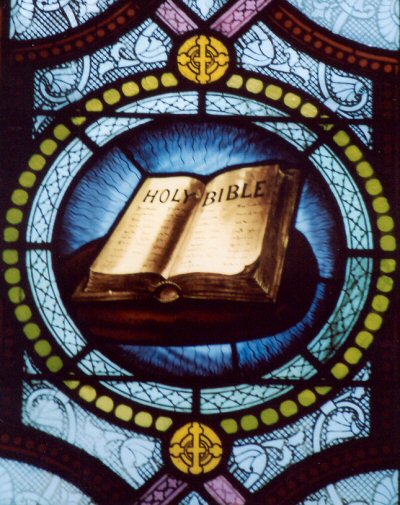 Liturgy of the Word
Liturgy of the WordTwenty-first Sunday in Ordinary Time
August 23, 2020 Cycle A
Green priestly vestments symbolize hope and the vitality of
the life of faith.
Home Page
Liturgical Year Cycle
2019-2020
Introductory Acts Of Worship
The Entrance Prayers:
On Sunday, usually a hymn praising God
is sung in place of reciting a Psalm from the Bible which invites us to
enter more deeply into the mystery of God's love for us. The recited
weekday Psalm expresses a youthful heart and spirit, delighted that we may come
before the living God.
Entrance Song
/ Entrance Psalm (Antiphon)
Entrance Song
Psalm: 86:1-3 Turn
your ear, O Lord, and answer me; save the servant who trusts in you, my God.
Have mercy on me, O Lord, for I cry to you all the day long.
The Priest Approaches and Kisses the Altar: The altar is a symbol of Christ. In it are cut five crosses to recall the five wounds of Christ. The altar also represents the Church and has embedded in it the relics of her saints. The priest comes to the altar to celebrate the Sacrifice in the Church's name. Because of the glory surrounding the altar upon which the divine Sacrifice will be made, the kiss of the priest unites the Church to Christ, its Redeemer.
Priest:
In the name of the Father, and of the Son, and of the Holy Spirit.
All:
Amen.
The Greeting: We are welcomed in God's name. Our response unites us to our neighbor, to the priest and to God. (The priest may select from several forms of greeting).
Priest: Grace to you and
peace from God our Father and the Lord Jesus Christ.
All:
And with your spirit.
The Penitential Prayers: We recognize our guilt for past sins, express our sorrow for them, and ask that Mary, the angels, the saints, and our brothers and sisters in Christ pray for the Lord God's mercy. (The priest may select from several forms).
Priest: Brothers and sisters, let us
acknowledge our sins, and so prepare ourselves to celebrate the sacred
mysteries. Have mercy on us, O Lord.
All: For we have sinned against you.
Priest: Show us, O Lord, your mercy.
All: And grant us your salvation.
The Absolution:
Priest: May almighty God have
mercy on us, forgive us our sins, and bring us to everlasting life.
All: Amen.
The Gloria: The Glory of God prayers have existed from the second century. They repeat the angels praise of God which heralded the birth of Christ on earth. Our praise is lifted again through the years as we rejoice at His coming as Lord, God, the most high Jesus Christ, who at Christmas took on our human nature while at the same time being the son of Man. This ancient hymn expresses our recognition of God's glory and love. It calls upon Christ as our holy and divine mediator, and the Holy Spirit who forever binds us together in God's love.
Priest and All: Glory to God in the highest, and on earth peace to people of good will. We praise you, we bless you, we adore you, we glorify you, we give you thanks for your great glory, Lord God, heavenly King, O God, almighty Father. Lord Jesus Christ, Only Begotten Son, Lord God, Lamb of God, Son of the Father, you take away the sins of the world, have mercy on us; you take away the sins of the world, receive our prayer; you are seated at the right hand of the Father, have mercy on us. For you alone are the Holy One, you alone are the Lord, you alone are the Most High, Jesus Christ, with the Holy Spirit, in the glory of God the Father. Amen.
The Collect: The priest lifts the united prayers and petitions of the congregation to God the Father through the merits of Jesus Christ in the Holy Spirit.
Priest: O God, who cause the minds of the faithful to unite in a
single purpose, grant your people to love what you command and to desire what
you promise, that, amid the uncertainties of this world, our hearts may be fixed
on that place where true gladness is found. Through our Lord Jesus Christ,
your Son, who lives and reigns with you in the unity of the Holy Spirit, one
God, for ever and ever.
 Liturgy of the Word
Liturgy of the Word
Christ is made known to us through the Old Testament which prepares us to recognize Him. In those days, God inspired men who spoke His message. Now, the New Testament Gospel reading announces His presence to us directly through His Son. Both readings bring God's message to us. Our responsibility is to respond.
The First Reading:
From the Old Testament
Priest/Reader: A reading from the
book of Kings.
First Reading: Isaiah 22:19-23
Thus says the Lord to
Shebna, master of the palace: “I will thrust you from your office and pull you
down form your station. On that day I will summon my servant Eliakim, son of
Hilkiah; I will cloth him with your rode, and gird him with your sash, and give
over to him your authority. He shall be a father to the inhabitants of
Jerusalem, and to the house of Judah. I will place the key of the House of
David on Eliakim’s shoulder; when he opens, no one shall shut; when he shuts, no
one shall open. I will fix him like a peg in a sure spot, to be a place of
honor for his family.”
Priest/Reader:
The Word of the
Lord.
All: Thanks
be to God.
The Responsorial Psalm: This Psalm praising God, is a prayer to God, or recommends the practice of virtue. It is sung as an interlude between the scriptural readings. It provides yet another instructional setting and invites the assembly to imitate the cantor who sings a repeated response to the verses of an ancient Psalm many of which are attributed to King David. The verses are sung first by a cantor (song leader) accompanied by instruments, the refrain is sung by the people.
Psalm 138:1-2, 2-3, 6, 8
Cantor: Lord, your love is eternal; do not forsake the work of your
hands.
All: Lord, your love is
eternal; do not forsake the work of your hands.
Cantor: I will give thanks to you, O Lord, with all my heart, for you
have heard the words of my mouth; in the presence of the angels I will sing your
praise; I will worship at your holy temple.
All: Lord, your love is
eternal; do not forsake the work of your hands.
Cantor:
I will
give thanks to your name, because of your kindness and your truth: when I
called, you answered me; you built up strength within me.
All: Lord, your love is
eternal; do not forsake the work of your hands.
Cantor: I will give thanks to your name, because of your kindness and
your truth: when I called, you answered me; you built up strength within me.
All: Lord, your love is
eternal; do not forsake the work of your hands.
Cantor: The Lord is exalted, yet the lowly he sees, and the proud
he knows from afar. Your kindness, O Lord, endures forever; forsake not the
work of your hands.
All: Lord, your love is
eternal; do not forsake the work of your hands.
The Second Reading: Taken from the New Testament, often from a letter written by St. Paul.
Second Reading: Romans 11:33-36
Oh, the depth of the riches and wisdom and knowledge of God! How inscrutable are his judgments and how unsearchable his ways! For who has known the mind of the Lord or who has been his counselor? Or who has given the Lord anything that he may be repaid? For from his and through him and for him are all things. To him be glory forever. Amen.
The Alleluia: An ancient expression of joy anticipating the Lord's message we will hear in the Gospel.
Matthew: 16:18
Cantor: Alleluia!
Alleluia! Alleluia!
All:
Alleluia! Alleluia! Alleluia!
Cantor: You are Peter and upon this rock I will build
my Church and the gates of the netherworld shall not prevail against it.
All:
Alleluia! Alleluia! Alleluia!
The Gospel:
The Liturgy of the Word is completed
by the reading of the Gospel. Before its reading, the members of the
assembly trace the sign of the cross upon the forehead to indicate their mental
acceptance of the Truth, on the lips to indicate their readiness to announce it,
and over the heart to indicate their sincere desire to accept it into their
lives. The "Good News" of the Gospel tells that God's kingdom has come for
all to hear, accept, and announce to the world for its salvation. It is God
who is
speaking to us. Christ comes to teach us by the example of His life
and by His own words.
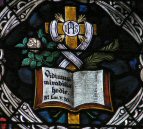 Priest: Cleanse my heart and my lips, almighty God, that I may worthily proclaim your
holy Gospel. Through the words of the Gospel may our sins be wiped away.
Priest: Cleanse my heart and my lips, almighty God, that I may worthily proclaim your
holy Gospel. Through the words of the Gospel may our sins be wiped away.
Priest: The Lord be with you.
All: And
with your spirit.
Priest/Deacon: A
reading from the holy Gospel according
to Matthew.
All: Glory
to you, Lord.
The Gospel: Matthew 16:13-20
Matthew wrote to show that Christ
was the
Messiah and fulfilled the Jewish prophecies.
 Jesus
went into the region of Caesarea Philippi and he asked his disciples, “Who do
people say that the Son of Man is?” They replied, “Some say John the Baptist,
others Elijah, still others Jeremiah or one of the prophets.” He said to them,
“But who do you say that I am?” Simon Peter said in reply, “You are the Christ,
the Son of the living God.” Jesus said to him in reply, “Blessed are you, Simon
son of Jonah. For flesh and blood has not revealed this to you, but my heavenly
Father. And so I say to you, you are Peter, and upon this rock I will build my
church, and the gates of the netherworld shall not prevail against it. I will
give you the keys to the kingdom of heaven. Whatever you bind on earth shall be
bound in heaven; and whatever you loose on earth shall be loosed in heaven.”
The he strictly ordered his disciples to tell no one that he was the Christ.
Jesus
went into the region of Caesarea Philippi and he asked his disciples, “Who do
people say that the Son of Man is?” They replied, “Some say John the Baptist,
others Elijah, still others Jeremiah or one of the prophets.” He said to them,
“But who do you say that I am?” Simon Peter said in reply, “You are the Christ,
the Son of the living God.” Jesus said to him in reply, “Blessed are you, Simon
son of Jonah. For flesh and blood has not revealed this to you, but my heavenly
Father. And so I say to you, you are Peter, and upon this rock I will build my
church, and the gates of the netherworld shall not prevail against it. I will
give you the keys to the kingdom of heaven. Whatever you bind on earth shall be
bound in heaven; and whatever you loose on earth shall be loosed in heaven.”
The he strictly ordered his disciples to tell no one that he was the Christ.
Priest/Deacon: The Gospel of the Lord.
All: Praise
to you, Lord Jesus Christ.
The Priest's Sermon:
The priest develops, explains, and comments upon the Master's words,
so our minds may be
enlightened, and our
hearts enriched.
(A priestly reflection upon this Gospel)
Profession of Faith: We state in the Nicene Creed the principles of our faith in precise and definite terms.
All: I believe in one God, the Father, the Almighty, maker of heaven and earth, of all that is seen and unseen. I believe in one Lord, Jesus Christ, the Only Begotten Son of God, born of the Father before all ages. God from God, Light from Light, true God from true God, begotten, not made, consubstantial with the Father; through him all things were made. For us men and for our salvation he came down from heaven, and by the Holy Spirit was incarnate of the Virgin Mary, and became man. For our sake he was crucified under Pontius Pilate, he suffered death and was buried, and rose again on the third day in accordance with the Scriptures. He ascended into heaven and is seated at the right hand of the Father. He will come again in glory to judge the living and the dead and his kingdom will have no end. I believe in the Holy Spirit, the Lord, the giver of life, who proceeds from the Father and the Son, who with the Father and the Son is adored and glorified, who has spoken through the prophets. I believe in one, holy, catholic and apostolic Church. I confess one Baptism for the forgiveness of sins and I look for the resurrection of the dead and the life of the world to come. Amen.
General Intercessions: We pray for the needs of the pope, civic leaders, our own needs, those of others, the sick, the dying, those who have died, the church, and the world. The response of all to each intercession: Lord, hear our prayer.
All: Lord, hear our prayer.
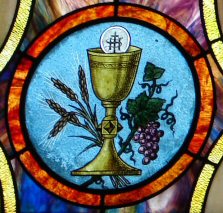 The Liturgy of the Eucharist
The Liturgy of the Eucharist
Gifts of bread and wine
symbolizing ourselves are presented to the priest who will offer them to God the
Father. Through the Holy Spirit, they will become the Body and Blood of
Jesus Christ whom we receive in Holy Communion. Jesus unites Himself with
us for our spiritual nourishment and strength. Today, when individuals do
not present their own personal offerings of bread and wine, the monetary contribution
symbolizes the material of their united sacrifice. The priest makes and
offering of the bread and wine to God.
Preparation of the Bread and Wine:
Priest: Blessed are you, Lord God of all creation,
for through your goodness we have received the bread we offer you: fruit of the earth and work of human hands, it will become for us the bread of
life.
All: Blessed be God for ever.
Priest: By the mystery of this water and wine may we come to share in the divinity of Christ, who humbled himself to share in our humanity.
Priest: Blessed are you, Lord God of all creation, for through your goodness we have
received the wine we offer you; fruit of the vine and work of human hands it will become our spiritual drink.
All: Blessed be God for ever.
Priest: With humble spirit and contrite heart may we be accepted by you, O Lord, and may our sacrifice in your sight this day be pleasing to you, Lord God.
The Priest's Hands are Washed: This act was traditionally necessary because the priest handled the various gifts presented by the people. Now, the cleansing act using water reminds the priest and ourselves of the need to cleanse not only the hands but the soul. Soon, the priest's hands will hold the actual body of Christ, and we will become His dwelling place.
Priest: Wash
me O Lord, from my iniquity and cleanse me from my sin.
Pray, brethren, that
my sacrifice and yours may be acceptable to God, the almighty Father.
All: May the Lord accept the sacrifice at your hands for the praise and glory of his name, for our good and the good of all his holy Church.
Prayer over the Gifts: Speaking in our name, the priest asks the Father to accept the gifts we offer through him.
Priest: O
Lord, who gained for yourself a people by adoption through the one sacrifice
offered once for all, bestow graciously on us, we pray, the gifts of unity and
peace in your Church. Through Christ our Lord.
All: Amen.
The Liturgy of the Eucharist
 Gifts of bread and wine
symbolizing ourselves are presented to the priest who will offer them to God the
Father. Through the Holy Spirit, they will become the Body and Blood of
Jesus Christ whom we receive in Holy Communion. Jesus unites Himself with
us for our spiritual nourishment and strength. Today, when individuals do
not present their own personal offerings of bread and wine, the monetary contribution
symbolizes the material of their united sacrifice. The priest makes and
offering of the bread and wine to God.
Gifts of bread and wine
symbolizing ourselves are presented to the priest who will offer them to God the
Father. Through the Holy Spirit, they will become the Body and Blood of
Jesus Christ whom we receive in Holy Communion. Jesus unites Himself with
us for our spiritual nourishment and strength. Today, when individuals do
not present their own personal offerings of bread and wine, the monetary contribution
symbolizes the material of their united sacrifice. The priest makes and
offering of the bread and wine to God.
Eucharistic Prayer:
(Number Two: The priest may select from several forms).
Priest: The Lord be with you.
All: And with your
spirit.
Priest: Lift up your hearts.
All: We lift them up to the Lord.
Priest: Let us give thanks to the Lord, our God.
All: It is right
and just.
Preface Prayer:
It is truly right and just, our duty and our salvation, always and everywhere to give you thanks, Lord, holy Father, almighty and eternal God, through Christ our Lord.
For through his Paschal Mystery, he accomplished the marvelous deed, by which he has freed us from the yoke of sin and death, summoning us to the glory of being now called a chosen race, a royal priesthood, a holy nation, a people for your own possession, to proclaim everywhere your mighty works for you have called us out of darkness into your own wonderful light. And so, with Angels and Archangels, with Thrones and Dominions, and with all the hosts and Powers of heaven, we sing the hymn of your glory, as without end we acclaim:
Acclamation:
Priest and All: Holy, Holy, Holy Lord, God of hosts. Heaven and earth are full of your glory. Hosanna in the highest. Blessed is he who comes in the name of the Lord. Hosanna in the highest.
The priest repeats the words which
Christ used at his Last Supper when He changed the bread into His Body and the
wine into His Blood. His Body and Blood are truly present but under the
appearance of bread and wine. The death of Christ is prolonged in each of
those who receive Him worthily. We apply His death to ourselves so that we
may share His glory. This moment is the most solemn on earth because it is
Divine act which enables us to apply to ourselves the Cross which Christ
willingly took upon Himself.
We are called to die to
sin and lift our very selves to God so that we become changed; to do as God
would have us do, to become what God would
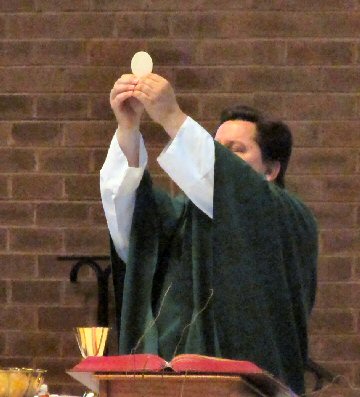 have
us become. Our own little cross can lift us into union with Christ's Cross
so we may earn the joys of everlasting happiness with God the Father.
have
us become. Our own little cross can lift us into union with Christ's Cross
so we may earn the joys of everlasting happiness with God the Father.
Priest: You are indeed Holy, O Lord, the fountain of all holiness. Make holy, therefore, these gifts, we pray, by sending down your Spirit upon them like the dewfall, so that they may become for us the Body and Blood of our Lord Jesus Christ. broke it, and gave it to his disciples, saying:
Take this, all of you, and eat of it, for this is my Body, which will be given up for you.
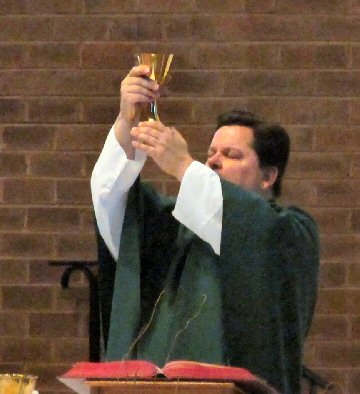 In a similar way, when supper was ended, he
took the chalice and, once more giving thanks, he gave it to his disciples,
saying:
In a similar way, when supper was ended, he
took the chalice and, once more giving thanks, he gave it to his disciples,
saying:
Take this, all of you, and
drink from it, for this is the chalice of my Blood, the Blood of the new and
eternal covenant, which will be poured out for you and for many for the
forgiveness of sins. Do this in memory of me.
Memorial Acclamation: (The priest may select from several forms).
Priest: The
mystery of faith.
Priest
/ All: When we
eat this Bread and drink this Cup, we proclaim your Death, O Lord, until
you come again.
Memorial Prayer: (The priest may select from several forms).
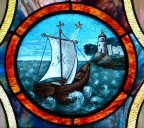 Priest,
recalling Christ's Passion, Resurrection, Ascension, the Church,
the dead, and ourselves.
Priest,
recalling Christ's Passion, Resurrection, Ascension, the Church,
the dead, and ourselves.
Therefore, O Lord, as we celebrate the memorial of his Death and
Resurrection, we offer you, Lord, the Bread of life and the Chalice of
salvation, giving thanks that you have held us worthy to be in your presence and
minister to you. Humbly we pray that, partaking of the Body and Blood of
Christ, we may be gathered into one by the Holy Spirit.
Remember, your Church, spread throughout the world, and bring her to the fullness of charity, together with _____ our Pope, and _____ our Bishop, and all the clergy. Remember also our brothers and sisters who have fallen asleep in the hope of the resurrection, and all who have died in your mercy: welcome them into the light of your face.
Have mercy on us all, we pray, that with the Blessed Virgin Mary, Mother of
God, with blessed Joseph her spouse, the blessed Apostles,
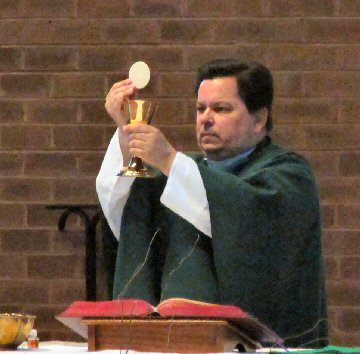 and
all the Saints who have pleased you throughout the ages, we may merit to be
coheirs to eternal life, and may praise and glorify you through your Son, Jesus
Christ.
and
all the Saints who have pleased you throughout the ages, we may merit to be
coheirs to eternal life, and may praise and glorify you through your Son, Jesus
Christ.
Prayer of Praise:
Through
him, with him, and in him, O God, almighty Father, in the unity of the Holy
Spirit, all glory and honor is yours, for ever and ever.
All: Amen.
Communion Rite
In the Liturgy of the Eucharist, we symbolically offer ourselves to the Lord through the gifts of bread and wine. At the Consecration, we offer our very lives to be united the God the Father through the Cross of Christ. In Communion, we find that we have not died at all, but have come to life. We have surrendered ourselves to God through His Divine Son, Jesus Christ. In return become ennobled and enriched. We give up time and we get eternity, we give up our sin and we receive grace, we surrender our self-will and receive the strength of the Divine Will, we give up ourselves and we receive everything. For the Son of God says to us that unless we receive Him we shall not have Divine life in us. But it is not really we who receive Christ as it is Christ who receives us, bringing us into Himself.
God makes His Cross the very means of our salvation and our life. While we have crucified Him, His eternal love cannot be extinguished. Christ willed to give us the very life we crucified in our Redemption, the Consecration of Holy Thursday into Communion, His death into our everlasting life.
The Lord's Prayer:
Priest: At
the Savior's command and formed by divine teaching, we dare to say:
Priest and
All: Our
Father, who art in heaven, hallowed be they name; Thy kingdom come; Thy will be
done on earth as it is in
heaven. Give us this
day our daily bread, and forgive us our trespasses, as we forgive those who
trespass against us; and lead us not into temptation, but deliver us from evil.
Priest: Deliver us, Lord, we pray, from every evil, graciously grant peace in our days, that, by the help of your mercy, we may be always free from sin and safe from all distress, as we await the blessed hope and the coming of our Savior, Jesus Christ.
All: For the kingdom, the power and the glory are yours now and forever.
Prayer for Peace:
Priest: Lord Jesus Christ, who said to your Apostles: Peace I leave
you, my peace I give you, look not on our sins, but on the faith of your Church,
and graciously grant her peace and unity in accordance with your will. Who
live and reign for ever and ever.
All: Amen.
Priest: The peace of the Lord be with
you always.
All: And with your spirit.
Priest: Let us offer each other the sign of peace.
Breaking of the Bread:
Priest: May this mingling of the Body and Blood of our Lord Jesus Christ bring eternal life to us who receive it.
Priest and All: Lamb of God, you take away the sins of the world,
have mercy on us.
Lamb of God, you take away the sins of the world, have mercy on us.
Lamb of God, you take away the sins of the world, grant us peace.
Priestly Preparation: Lord Jesus Christ, Son of the
living God, who, by the will of the Father and the work of the Holy Spirit,
through your
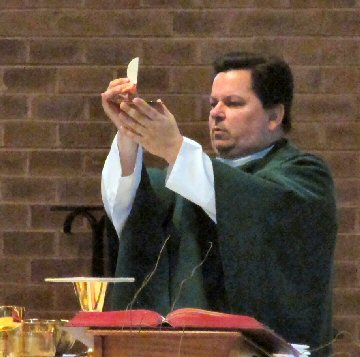 Death
gave life to the world, free me by this, your most holy Body and Blood, from all
my sins and from every evil; keep me always faithful to your commandments, and
never let me be parted from you.
Death
gave life to the world, free me by this, your most holy Body and Blood, from all
my sins and from every evil; keep me always faithful to your commandments, and
never let me be parted from you.
Priest: Behold
the Lamb of God, behold him who takes away the sins of the world. Blessed
are those called to the supper of the Lamb.
Priest and All: Lord, I am not worthy that you should enter under my roof, but only say the world and my soul shall be healed.
Priest: May the Body of Christ keep me safe for eternal life.
May the Blood of Christ keep me safe for eternal life.
Communion Antiphon:
Psalm 104:13-15
The earth is replete with the fruits of your work, O Lord; you bring forth bread from the earth and wine to cheer the heart.
Communion of the Faithful:
Priest: The Body of Christ.
The Faithful: Amen.
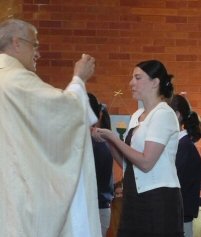
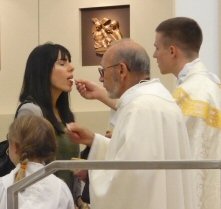
Priest/Deacon/
Extraordinary Eucharistic Minister:
The Blood of Christ.
The Faithful: Amen.
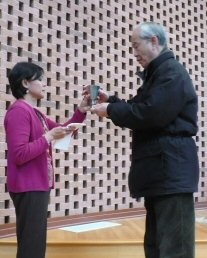
Cleansing of the Vessels:
Priest: What has passed our lips as food, O Lord, may we possess in purity of heart, that what has been given to us in time may be our healing for eternity.
Prayer after Communion:
Priest: Let us pray.
Priest: Complete
within us, O Lord, we pray, the healing work of your mercy and graciously
perfect and sustain us, so that in all things we may please you. Through
Christ our Lord.
Concluding Rite
Priest: The Lord be with you.
All: And
with your spirit.
Priest: Bow
down for the blessing.
Dismissal Prayer: (The priest may select
from several forms)
Priest: May the God of all consolation order your days in his peace
and grant you the gifts of his blessing.
All: Amen.
Priest: May he free you always from every distress and confirm your
hearts in his love.
All: Amen.
Priest: So that on this life's journey you may be effective in good
words, rich in the gifts of hope, faith and charity, and may come happily to
eternal life.
All: Amen.
Final Blessing
Priest: And may be blessing of almighty God, the Father, and the
Son, and the Holy Spirit, come down on you and remain with you for ever.
All: Amen.
Priest: Go in peace.
All: Thanks be to God.
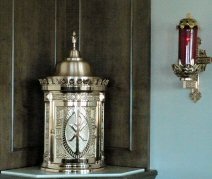 O my Jesus, forgive us our sins.
O my Jesus, forgive us our sins.
Save us from the fires of hell.
Lead all souls to heaven,
especially those in most need of your mercy.
www.Divinemasterplanforlife.com
www.Saintsnheaven.com
Home Page
Liturgical Year Cycle
2019-2020